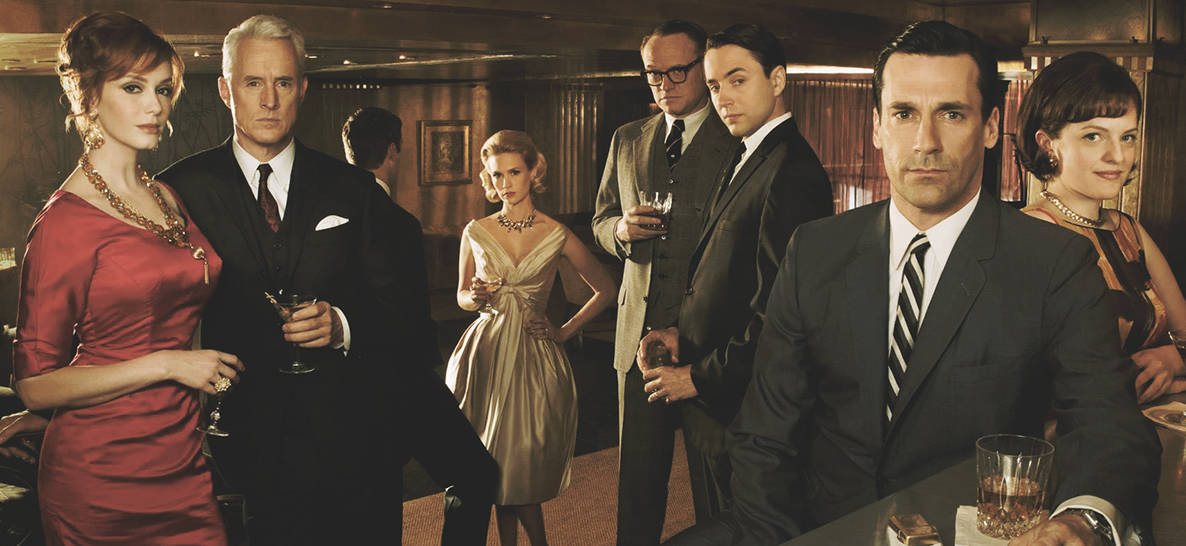
Editor’s Note: This piece is an examination of the significance of Mad Men as a series, and also look ahead to the final seven episodes. It does contain some spoilers about the first six seasons.
On Sunday night, AMC will kick off part two of the final season of Mad Men. In the last seven episodes, audiences will not only say goodbye to one of TV’s best casts, they’ll also finally get to see what becomes of Don Draper. Will all of our questions about Draper’s past be answered? What does the future hold for the controversial ad man? And, most importantly, will he finally find redemption?
The Show that Changed Cable
Really, Mad Men shouldn’t have survived Season One. The odds were low that a dense, character driven, ensemble period piece would find a longstanding audience, much less on basic cable. There were no known actors attached (this, after all, was before Jon Hamm and Christina Hendricks were Jon Hamm and Christina Hendricks). There was no violence, no action, no graphic realism found in a generation of shows that had been ushered in following the success of HBO’s gritty drama The Sopranos.
What Mad Men did have going for it in the early stages was creator Matthew Weiner. Weiner had been planning his magnum opus for more than 15 years, eight of which he spent as staff writer on The Sopranos where he learned under showrunner David Chase and witnessed the TV landscape change to a more Mad Men-friendly environment. Yet when it came time for the show to be picked up, HBO and Showtime both passed. These were the premium cable outlets that Weiner thought would allow the show to live and breathe as he intended. What the show needed was someone to take a chance on Weiner’s singular vision. Ironically, Mad Men found a home at a pre-Breaking Bad, pre-Walking Dead AMC who was looking to shed their perception as the cable movie channel that made you sit through commercials.
While Mad Men never got above a “decent cable” rating, the show always survived the competitive Sunday night slot and maintained unrivaled critical acclaim, including 105 Emmy nominations. It has also benefited from the post-Lost online TV community that analyzes, critiques and heralds every episode, providing the show an afterlife far beyond its initial airing.
A Cultural History Lesson
Those who faithfully watched Mad Men, or binge-watched to catch up, have bore witness to the entirety of the ’60s on showcase, beginning with the remnants of a Leave It to Beaver America in 1960. Since then, the Kennedy Assassination, the Civil Rights Movement, Vietnam, the Hare Krishna movement, LSD, hippies and the moon landing have all made appearances on the show—albeit, seen from a view from high atop the skyscrapers on Madison Avenue, where the current events below are always superfluous to making sure the clients are kept south of 86th St. and the ice buckets in the liquor cabinets are always filled.
The show will always be remembered for the fashion (mid-century is so 2015), the ads (VW Lemon), the music (yes, even The Beatles), the quirkiness (“Zou Bisou Bisou”) and the conspiracies (Who the heck is Bob Benson?).
The Allure of Don Draper
Yet, all of this brilliant texture has served to support the journey of the leading man, Don Draper: He was part metaphor for the burgeoning American Dream, part criticism of it. Draper’s story highlighted real social problems like discrimination and sexism, but also examined more personal questions that shaped one of TV’s best characters: What happens if you are willing to shed your past, are lucky enough to assume someone else’s identity, and can present confidence, impenetrable confidence, at all times?
This is where we met Don, at the top, with his winning pitches and client charisma overpowering any moral dilemmas. However, unlike many shows’ slowly ascending story arches, his journey since the first episode has been more of a plummet than a glorious rise. He’s ruined two marriages, disregarded parental duties, severed all forms of genuine friendship and maintained a steady diet of Old Fashioneds and infidelity to subdue the guilt of his past and cover the shame of his present.
Don hasn’t been the only member of SCDP and Co. to tumble. We’ve already lost Lane, Ginsberg lost his mind. Joan found that you must “do whatever it takes” to hang with the boys, and the once quick-witted silver fox Roger Sterling now exists in a perpetual purple haze of regret.
Is There Room for Redemption?
Despite the wealth of evidence against a turn for the better, it’s worth asking after 85 episodes of varying level of indiscretion, is there room in the story for a redeemed Don?
The moments that do hint at hope have been few, but meaningful. Most notably the “Hershey Pitch” at the end of season six in which the truth of Don’s childhood, the abusive uncle, the brothel he was raised in all came to the surface when he least expected it, in front of the precious clients. It ended up costing him his standing in the company, but in those fleeting moments, he was free from the bondage that he long carried.
This revelation, the pronouncement of truth, led to the indelible moment of Don and his kids in front of the house he grew up in. Sally looked to her father, getting a glimpse of who he really is, maybe for the first time, and things seemed forever changed. If only the show had ended at season six!
But, alas, there is a season seven, and Don has crawled his way back into the upper ranks of the ad world. Could it be that all along, the dark figure in the show’s opening credits is a foreshadowing of Don’s fate, forever in a free fall past billboards that promise the “the best America has to offer”? Or perhaps Weiner is leading to a redemptive twist, where the man who mastered the art of selling happiness will finally find it for himself.
The most recent clue we have to go on is the final images of the last episode. Don is visited by a premonition of the recently deceased Bert Cooper. Bert, after greeting Don, proceeds to dance with secretaries and break out in song. “Love belongs to everyone, the best things in life are free,” Bert offers.
Perhaps Don’s redemption can be found in the answer to one simple question: Does Don believe him?























